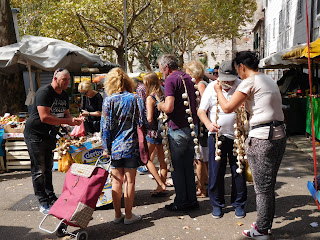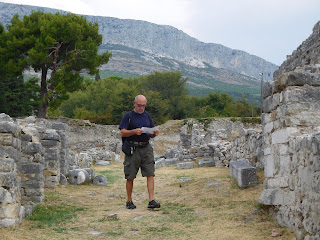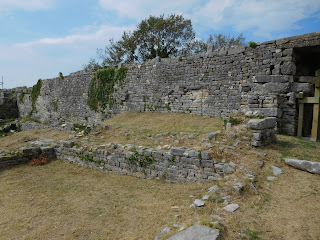After having read about Diocletian’s birthplace of Salona
and knowing it was only a few miles from Split ,
we took a city bus out there our last morning in Split .
Unlike most buses we’ve been on, there was no display or announcements of the upcoming busstop so we
asked the driver to let us know where the Salona stop was.
We didn’t realize the bus driver had forgotten to tell us
where to get off until we reached the end of the line. So, we had time to wait
and ‘chill’ while the driver smoked a few cigarettes, chatted on his phone
until we were on our merry way again. Chris: I think Steven and I both needed
some of your chill pills, aka m&ms, then but they were back at the
apartment unfortunately! Any other day we wouldn’t have minded one iota about
this situation but we only had a few hours before leaving town for our next
destination so it was rather nerve wracking.
Our travel notes did recommend we arrange a guide through the local tourist office before coming to Salona but of course we knew better and didn’t need that. Ha!
Salona was first established as an Illryian settlement, then
Greek but it only prospered in the 1st century BC by the Romans under Emperor
Augustus’ rule. The name Salona derives from the salt (sal in Latin) works in
the area. In the 1st century AD, the Romans built an amphitheater, theaters,
temples, baths, a Forum and town walls reinforced with towers. Salona became
the richest and most populated city in the mid-Adriatic.
Salona later fell under control of the Eastern European
Empire, but in the 7th century Avars and Slavs descended to rout and sack the
city. Those lucky enough to escape with their lives fled to Split
and never looked back. The buildings and the churches were stripped and the
stone was used for new buildings.
At the end of the 19th century excavations began to bring to
life the buried remnants of this ancient settlement. The entrance to the site
was the Necropolis of Manastirine, the burial area just outside the city walls.
In the 4th century, a religious building was constructed here to house the
relics of the Salonian saints, the victims of Diocletian’s persecution of
Christians.
Just beyond the Manastirine was the Tusuculum, a villa built in the last
century for the distinguished archeologist Frane Bulic, to enable him to study
Salona.
Bulic's Memorial Room:Photos of Tusuculum:
This walk led us to the main part of the archeological site.
We could just barely make out some of the old city walls which was the first thing we saw. According to one of the very few signs at the whole site, the walls took several centuries to build and began in the second century BC.
We could easily cover the 385 acre site on foot but we had no idea what we were looking at unfortunately the entire time. This was where a guide would have been so very handy – duh!
We read about the ruins of a 5th century cathedral but found
it all but impossible to determine where they were.
Steven trying to make sense of where we were! It was a valiant try but he was unsuccessful.
Somewhere on that massive site, there were ruins of a 2nd
century amphitheater able to accommodate 18,000 people. You would have thought
that we should have seen something like that but no, no luck!
The best preserved Roman construction was the Aqueduct as
that was easy enough to figure out what it was! It was built to bring water
from the River Jadro to the city and extended in the time of Emperor Diocletian
to reach his palace in Split . Repair
work was carried out at the end of the 19th century and the southern part of
the aqueduct is still in use.
The southern part of the site was the only part of Salona that we saw any work being done.
The original nucleus of Salona was encircled by walls and fortified with towers. During the reign of Emperor Augustus, a monumental eastern city gate was built. It was constructed of large rectangualr blocks cut in bluish local stone.
The baths or thermae are an amenity typical of the Roman civilization and therefore constituted an indispensable part of the Roman urban culture. According to a sign, they were the venue of intensive social and cultural life. Remains of a number of both public and private baths have been discovered in Salona. Without the sign, there is no way I would have guessed the photo below depicted baths though!
As we left, we noticed what appeared to be a stone graveyard:
For an archaeological site theoretically so famous and so
close to Split , I would have
expected there would be more infrastructure for tourists visiting Salona. There
were only a few signs in the massive complex indicating what was what.
Other tourists to Split must have been a whole lot smarter or more discerning than us as we only spotted a handful of others there the entire time. All wasn’t
wasted though as we got lots of exercise as we traipsed up and down the hilly
site. I like to think the photos are decent too even though I don’t know what
they are of! I developed a deeper admiration for archeologists and wondered how
they could tell so much about an ancient civilization from what seemed to us
were a pile of rocks!
The only writing we saw while at Salona was on this block in the 'graveyard.'
We didn’t have to wait too long for a return bus
to Split

Cory: I thought of you when we saw a sign from the bus saying "Get a ride in minutes using the Split uber app"!
Since we had unsurprisingly spent less time at
Salona than we figured on, we had extra time on our hands. So we walked back
through the Palace to the synagogue since it had been closed the other day.
The entrance to the synagogue:


There were a number of Israeli tourists listening to a man
relay the history of the synagogue. He talked proudly of the fact that there
had been no loss of Jews in WWII while the Italians occupied Split
as they protected the Jews. It was only when the Nazis came in 1943 that Jews
perished.

Names of Jews in Split
saved by the Italians:

He mentioned that there had only ever been a maximum of 300
Jews in the ghetto but there had been 200 Jews before the Italians came and
also and after they left. Now, he said, there are only 100 Jews left in Split
but they have all married non-Jewish women. His parents, even after the war,
were not observant Jews and didn’t pass on Jewish customs to him and his
siblings. He went to Jewish summer camp but otherwise participated little in
Jewish life while growing up.

One of the other tourists asked him about the younger
generation of Jews. He said that he and his contemporaries are the younger
generation as their parents have died. He pointed out that the responsibility
for ensuring the synagogue continues belongs to the international community because the
Jewish community in Split is small, old and has limited financial resources. As the synagogue is
located in the UNESCO-protected Palace, it’s under their supervision but
receives no money from them for its continued upkeep.
The synagogue, he said, was in a house built in the 13th
century before becoming a place of worship. He revealed that he volunteers every day at the
synagogue as that way he gets his free cup of coffee! It had been sobering
listening to him and, as we left, I couldn’t help but wonder what will become
of the synagogue in another decade or two when his generation is no longer alive to share the history of Jews in Split.
Diocletian’s Palace was so huge that we hadn’t taken the
time the other day to explore all its gates so we did that next. Near the Silver Gate was a wonderful little market that had lots of seasonal fruits and vegetables, homemade cheeses, hams and dried herbs.

I couldn’t help but nickname this fellow The Garlic Man!

In front of the gate is the Statue of St.
Catherine built in the Middle Ages. It was used by the Dominicans
while they built their own monastery.

We had some extra time on our hands before having to head
back to the apartment and get another bus to our next stop on the journey. So we decided to start walking up
a gazillion steps to see a protected nature reserve on the west side of town
called Marjan Forest

Those steps just went on forever and ever!

Views of Split
from what we thought was almost at the top! Hah – turned out we were only about
halfway up still.


Maureen: I thought of you here from the viewing platform as, if I had a smart phone like you, I could have charged it on this bench!

There were a lot of this sort of cactuses as we gained in elevation.
Seeing this church made Steven think we were back at the Alamo
in San Antonio
What, more steps?! We'd been hiking up all these steps for a good 40 minutes and were beginning to get worried about our timing since we didn't know how much further we had to keep climbing before we reached the summit.
After another ten minutes or so, we reached the summit at last – yeah! A statue of Luka Botic, whoever he may be!
It was great relaxing for a couple of minutes there but we didn’t feel like we could break out in song or stop and enjoy the views for long as we had a long ways down and still had a bus to catch.
As we walked down, we noticed all these benches that somehow
we had missed on the hike up. We both joked we had never seen so many benches
so close together before except when we were at the Lady Buddha in Danang, Vietnam last year.
A view of Marjan Forest once back in town. We were both huffing and puffing by the time we got down as we had been going at a good clip the whole time.
One of the stranger sights on our walk back through town was seeing this man. Didn't quite know what to make of him. Was he a church elder, someone in costume or what? (Hint: Stay tuned til a post on our next port of call!)
I couldn't pass up this double scoop ice cream cone on the way back to the apartment. I figured I earned it after all those steps I had just climbed!
As promised from a previous post about our otherwise huge apartment in Split, here are two photos of the tiniest kitchen I have ever seen or been in in my entire life. It was a scream, it was so minute!
We lugged our bags to the National Theater where there were a slew of taxis waiting luckily. We didn’t realize the driver had locked our doors until we tried to get out once we reached the bus station a few minutes later. When we asked him why, he said that way he’s assured of being paid because otherwise passengers hop out without paying. This way, when they say they have no money to pay, he says, “Fine, I’ll just take you to the police station.” That produces money very quickly, he joked!
En route to Dubrovnik, further south on Croatia's Dalmatian Coast, we had some glorious views out to sea and to the nearby
islands.
Posted from Prizren, Kosovo on September 17th, 2016.

















































What fun! Love the story of the taxi driver too. Now that's a way to make sure you get your money!
ReplyDeleteAnita,
ReplyDeleteGlad you found the taxi driver's tale as amusing as I did. You just never know where the tales will come from while traveling!
Annie
Anita,
ReplyDeleteGlad you found the taxi driver's tale as amusing as I did. You just never know where the tales will come from while traveling!
Annie